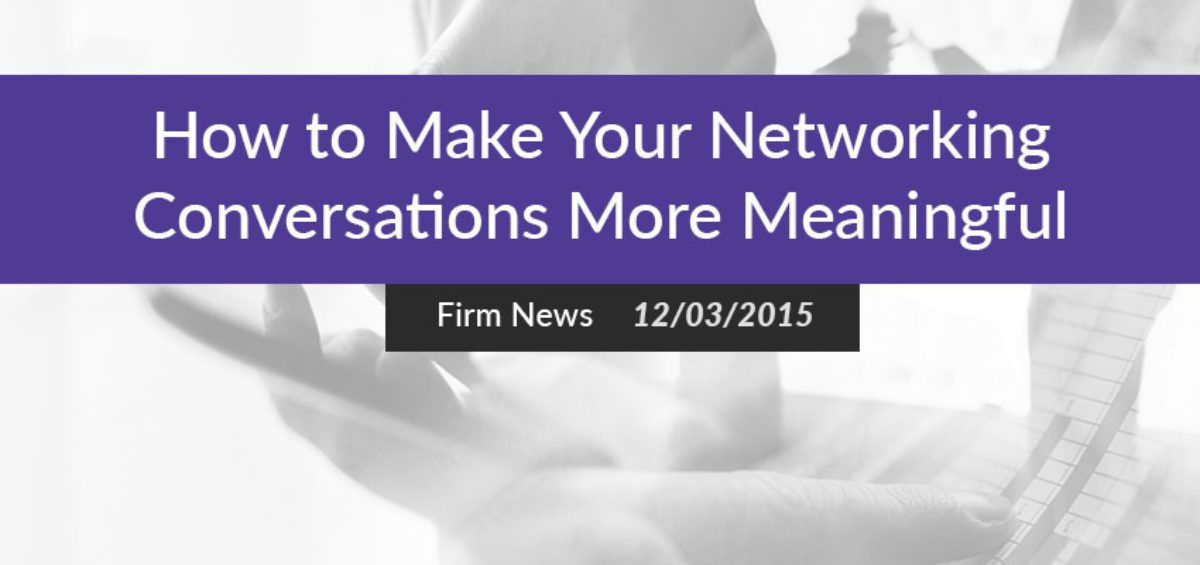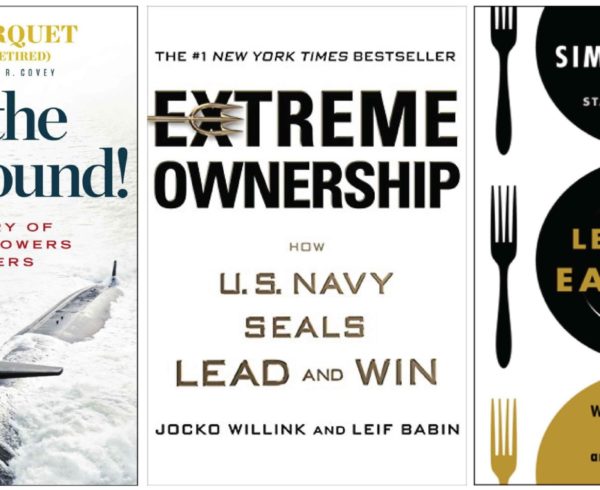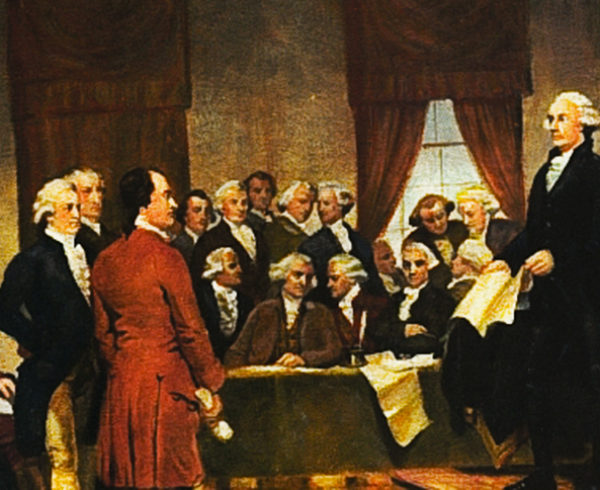December 3, 2015
Corbett Public Relations – Bill Corbett, Jr.
LEVO.com
How to Make Your Networking Conversations More Meaningful

When you issue an open call to career experts to weigh in on a bread-and-butter topic like networking, they flock. My oh my, do they flock. In 24 hours, I fielded 44 responses to one simple question: How do you make networking conversations meaningful? I was looking for feedback on how to break through the typical small talk—So, what do you do? Where are you from? How long have you been with this company?—and form a more authentic, substantial connection with a person.
The vast majority of the responses were exactly what you’d expect, and not at all what I was looking for. About 40 of the responses can be summarized as such: Research people in advance, ask questions, listen, and be truly engaged. People love to talk about themselves. It’s not bad advice—in fact its advice I’ve given myself on occasion (particularly to friends who don’t know when to shut up). All great conversations are founded on great listening, and it is a rare pleasure to talk to someone who is genuinely interested in what you have to say about your life.
[Related: Networking Hacks Every Girl Should Know]
But in my experience, finding yourself in a networking conversation in which you feel like you’re being interviewed is not just strange, but patently unpleasant. One professional said this outright—that she treats all networking conversations as if she’s interviewing the person, and if the conversation gets directed to her she turns it back around to the other person. Can anyone truly believe that this is an effective or authentic method of forming connections? These aren’t bots we’re dealing with here—they’re humans with interests and passions and perhaps, the desire to attend a networking happy hour and not be grilled.
[Related: The Introvert’s Guide to Networking]
The examples of specific questions ranged from legitimate to mind-boggling. Obviously interesting, light-hearted questions are important and helpful. For example, Wear Your Label founder Kayley Reed asks, “How did you get into this line of work?” Steve Silberberg of Fitpackingopens with a networking joke: “So…how can you help my career?” Amanda Slavin, founder and CEO of CatalystCreativ, loves to ask people, “What did you want to be when you were eight years old?” “It allows for people to think back to who they were before they had bills to pay or pressure to be something they were told to be, and just remember who they are at their core,” she says. “It opens up a conversation in a unique way.” I believe those questions can be very effective.
However, bombarding a person with awkward interview-esque questions is not. Think about how stressed you would be if someone started shooting these at you at an event: “What are you passionate about?” “What’s the single most important thing you’re tackling right now and how can I help with it?” “If a person were to describe you in one sentence, what would he/she say?” or “What is the one thing you would do if you knew you could not fail?” Like whoa, I’m just trying to grab a free glass of Pinot and maybe meet a few interesting people. EASY.
[Related: 17 Thoughts Literally Everyone Has While Networking]
Ultimately, networking is not about asking the “right” questions to prod someone or find out exactly how you can help them or they can help you—you can do that at your second meeting. Chad Reid, director of communications at Jotform, says it perfectly: “No one you meet at a networking event is going to know—or even care—whether or not you’re good at your job but they have an opportunity to like you. And that’s crucial to effective networking.” Exactly. Just make someone like you, then figure out the details later. So the question then becomes:How do you make someone like you?
Of those 44 responses, only two people seemed to know that coveted secret. In my experience meeting people in any situation—from networking all the way across the spectrum to dating—the single most effective tactic is to share. The path to meaningful connection is not asking a laundry list of questions, it’s sharing something personal about yourself, automatically inviting others to share in return. The most worthwhile networking conversations I’ve had have consisted not of a mutual sharing of accomplishments, but a mutual sharing of struggles and uncertainty to the tune of, “Honestly, I’m not sure, and here’s why.” Sharing a small insecurity or anxiety about your career or life in the city or whatever else you have in common cuts past the bull and puts you on the fast track to a “real” conversation, a genuine connection.
Speech and communication expert Ita Olsen has confirmed this through her research. “I do a lot of research and all the other experts’ advice I’ve read recommends asking questions. My advice is the exact opposite,” she says. “I train my clients to have an ‘arsenal of anecdotes’ at the ready in order to establish a strong, positive connection right off the bat. The anecdotes need to be short (15 to 30 seconds) and have a human or emotional element that people can relate to.” For example, one of her clients who is often asked, “How was your flight?” takes the opportunity to tell a story about a dangerous landing. Ita tells people that when she gets off the subway and goes the wrong way, she pretends she is window shopping. Both engage people immediately—the first getting them to chime in with scary flight stories, and the second making people laugh and share their own embarrassing moments. “Sharing emotions like fear and embarrassment warm people up and establish strong ties at the onset eliminating the need for boring Q&As,” Olsen says.
“There is no better way to break the ice than to be open and honest,” agrees Bill Corbett, Jr., president of Corbett Public Relations. “The best way to do this is to tell stories that are relevant and make an impact.” Being a good storyteller does not come easy, he warns. Contrived as it may sound, it takes practice. “If you are going to invest in networking, invest the time in practicing your storytelling. Practice your listening and learn how to ask questions…this expedites the trust and relationship process. The secret is building rapport and trust.”
Corbett says that one touching example stands out among many. One morning he was speaking with a member of a networking group whom he knew but not very well. “I saw that he looked tired and asked,” Corbett says. “He revealed to me he was undergoing chemotherapy. This was a wow moment for me. He opened up and immediately, we made a connection. It was not one of sorrow or pity, but one of concern and ironically, empowerment. Networking for him was a way to keep some normalcy in his life.” Obviously this information was not shared to get something out of it or “network” in the traditional sense—it was simply a powerful moment of real human connection. Unsurprisingly, the two have kept in touch and helped each other in turn. The moment that broke down the networking walls was a turning point in their relationship.
Ultimately networking, like anything else, is a balance. Don’t be a monologuer, but don’t pepper someone with contrived questions. Don’t dominate the room, but don’t just stand there and nod. What we all need to realize is that networking is no different than any other form of communication. It’s not about solving all your business problems, it’s about forming a connection with someone you’ve just met. And the best way to do that is to be real—don’t fake 100 percent certainty. Share something authentic, and you’ll get something authentic in return. Those are the relationships that will enrich you and engage you throughout your career, far beyond some petty job favor or meaningless introduction.






Leave a Comment